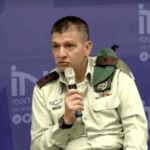Tuesday morning saw the arrival of Iranian President Ebrahim Raisi in Lahore. Upon visiting Allama Iqbal’s mausoleum, he emphasized his “special connection” to the people of Pakistan.
On the second day of his three-day official tour, Raisi and his delegation were met by Punjab Chief Minister Maryam Nawaz at the Allama Iqbal International Airport. After the general elections on February 8, this is the first head of state to visit Pakistan.
Iranian consul general in Lahore Mehran Movahhedfar, Punjab Chief Secretary Zahid Akthar Zaman, and Inspector General of Police Dr. Usman Anwar were among those who received him, according to PTV News.
Senator Pervaiz Rasheed, provincial ministers Uzma Bukhari, Mujtuba Shujaur Rehman, Khawaja Sulaiman Rafiq, Bilal Yasin, and Chaudhry Shafay Hussain, as well as senior province minister Marriyum Aurangzeb, were also present on the occasion.
Next, the president of Iran went to the mausoleum of Allama Iqbal and offered fateha and placed a floral wreath.
During the event, Raisi spoke and stated that he did not “feel like a stranger at all,” adding that the two countries were linked by “special emotions and connection” with Pakistani people.
“I desired for there to be a public rally so I could speak to the public, but for certain reasons, the conditions were such that it was not feasible,” he stated.
“I extend my greetings to the people of Pakistan and Lahore on behalf of the supreme leader of the Islamic Republic of Iran,” Raisi remarked, praising the “revolutionary spirit” that pervaded this crowd.
The president of Iran emphasized how Allama Iqbal, being a highly inspirational figure, was a very significant figure for Iran. Additionally, he expressed gratitude to the Pakistani government and people for their “strong stance taken against Zionist forces with us, Iran.”
Raisi was scheduled to visit Lahore and Karachi and meet with the provincial authorities, as previously announced by the Foreign Office (FO).
Prior to the arrival of foreign visitors, including Raisi, the governments of Punjab and Sindh have declared local holidays in the Karachi division and Lahore district for today (Tuesday) in order to “avoid the consequent inconvenience to the general public.” Drones are strictly prohibited in the Karachi division from April 22 to April 28 according to the Sindh government.
The Iranian president is scheduled to visit Karachi later today, when he will receive an honorary doctorate from the University of Karachi, according to Radio Pakistan.
First-day high-level meetings
Raisi had a busy day in Islamabad the day before, where the two parties agreed to boost trade to $10 billion over the following five years.
He had met with Prime Minister Shehbaz Sharif upon arriving in the capital and then spoke at a joint press conference, pledging to improve ties between the two nations at “high levels.”
Raisi later met President Asif Ali Zardari, with whom he agreed to strengthen current relations. The Iranian president spoke with General Asim Munir, Chief of Army Staff, about border security and regional stability.
While Interior Minister Mohsin Naqvi and his Iranian colleague Dr. Ahmad Vahidi agreed that both countries should outlaw terrorist organizations in their respective nations, Foreign Minister Ishaq Dar had also made a call to Raisi.
Eight agreements and Memorandums of Understanding (MoUs) for cooperation in a variety of disciplines were separately signed by the neighbors. Additionally, PM Shehbaz and Raisi renamed Iran Avenue, the freshly built section of Islamabad’s 11th Avenue, and officially opened it.
importance of the visit
After Iran conducted an unprecedented missile and drone attack on Israel more than a week ago in response for an airstrike on the Iranian consulate building in Damascus earlier this month, Raisi’s journey to Pakistan had been called into question as Middle East tensions escalated. Then, on Friday, there was an apparent Israeli attack on central Iran.
Tehran has downplayed the alleged Israeli attack and said it has no intentions to retaliate, seeming to be aiming to prevent the Gaza crisis from becoming a regional battle.
All Middle Eastern countries have been urged by Pakistan to “exercise utmost restraint and move towards de-escalation.”
The visit by Raisi is particularly noteworthy as Pakistan and Iran work to restore relations following their January tit-for-tat missile attacks. The cross-border attacks exacerbated the tensions in the region that Israel’s military campaign in Gaza had already stoked.
The same week that it bombed Syria and Iraq, Tehran launched strikes against a Pakistani anti-Iranian group. Pakistan retaliated by conducting a raid in the region of Sistan-Balochistan on “militant targets.” In the past, both nations have accused one another of providing sanctuary to extremists.
In addition, Pakistan is depending on an Iranian-led cooperative gas project to resolve an ongoing electricity issue that has impeded its economic expansion.
March 2013 saw the grand opening of a $7.5 billion gas pipeline between Iran and Pakistan, which is meant to supply power plants in Pakistan. However, as soon as Iran was sanctioned internationally, the project came to an instant halt.
The 1,800-kilometer pipeline that Tehran has constructed would eventually connect its South Pars gas reserves to Nawabshah.
An 80km stretch of the pipeline was allowed for construction in February by the caretaker administration that was leaving office in Pakistan, mainly to avoid having to pay Iran billions of dollars in penalties for years of delays.
Washington has stated that it does not support the project going forward and has warned Pakistan that it may face US penalties.








